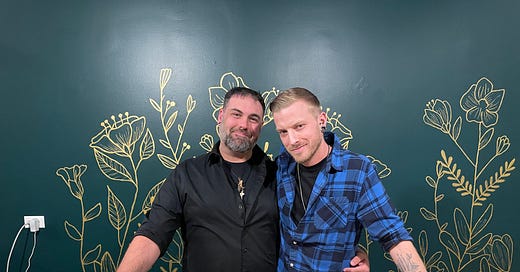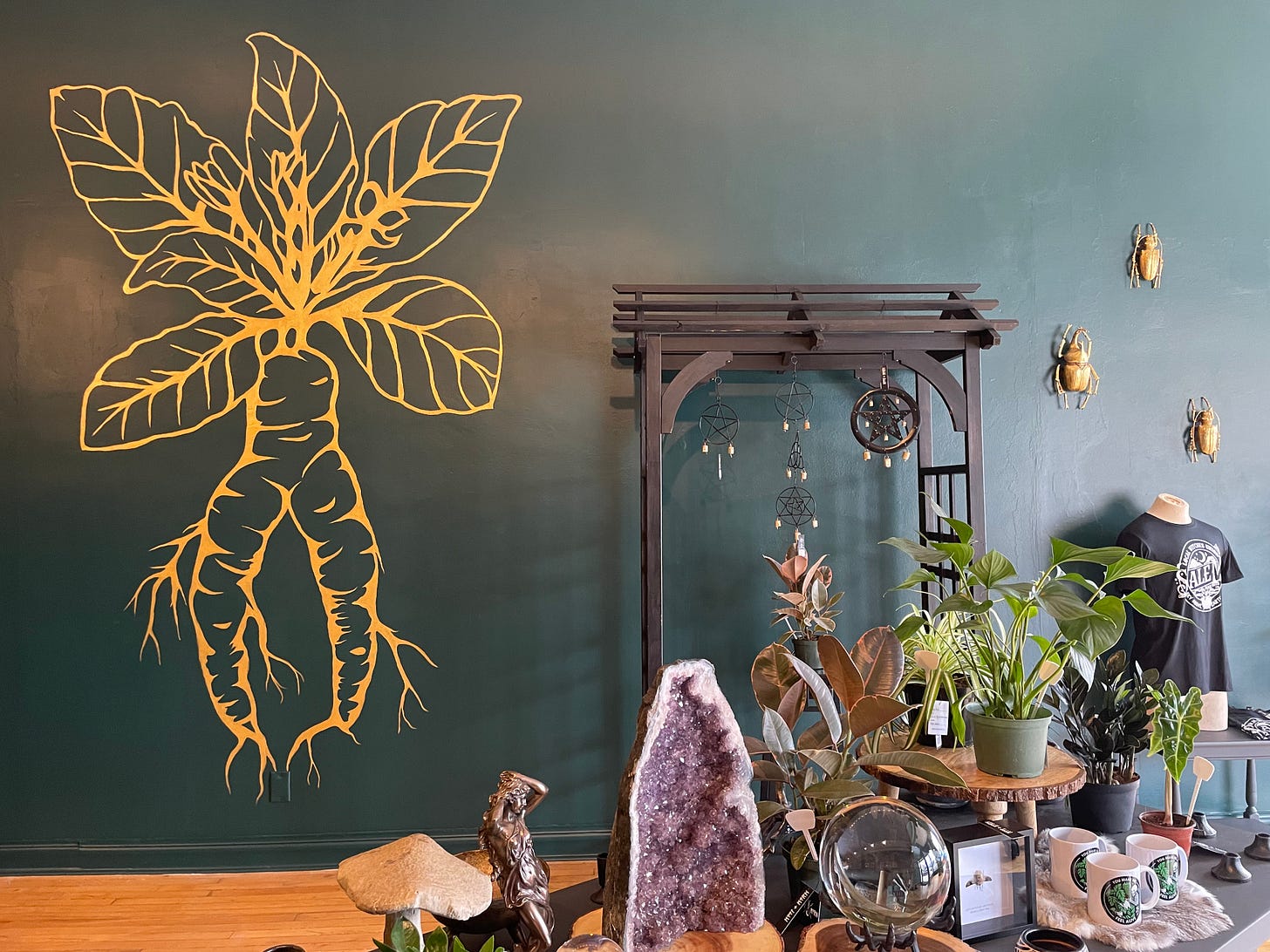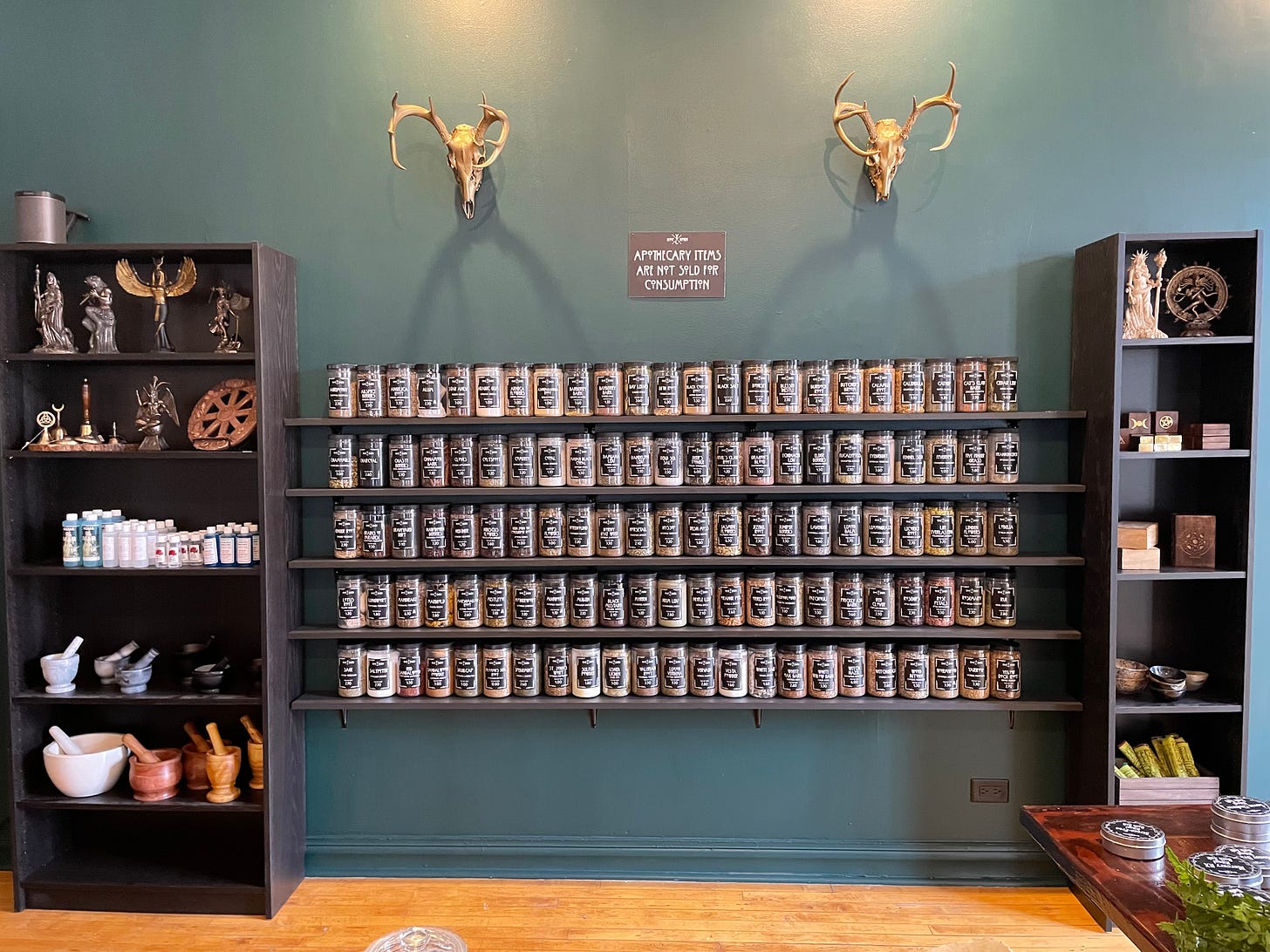how a far-flung suburb got a queer-owned witch shop.
I spoke with the owners of new Aurora shop Hoof & Horn about the queerness of the occult, hate in the ‘burbs and more.
Queering the Burbs is a weekly-ish distillation of pop culture, politics and queerness written by Joe Erbentraut. If you like what you see, please consider subscribing (it’s free!), liking or sharing this piece.
Halloween is a sacred time for queer people. It is a time of magic and mischief, a celebration of all things supernatural and mystical that feels inherently queer.
A recent Instagram post from writer Willow Defebaugh (shared by my dear friend Lyndsay) put it so exquisitely: “There is something about the occult that is inherently queer. Throughout history, both have been the subject of fear, fascination, and fantasy. We have been labeled witches, fairies, and shapeshifters—and there is a potent power in reclaiming these identities. … What could be more magic than that?” As artist Leo Herrera put it, each over-the-top costume choice and witchy twirl to a Stevie Nicks ballad is “raising delicious hell and casting Queer spells on a night that was always ours.”
So it comes as a happy accident in the western suburbs that a queer-owned witch shop, Hoof & Horn, opened its doors in downtown Aurora just in time for peak spooky season.
Yes, you read that right: a gay witch shop, right in the heart of the hinterland. Originally opened in Yorkville in 2018, the shop is an eye-catching addition to a stretch of Aurora that just keeps getting better and better. Inside, the shop carries a range of occult supplies including books, candles, herbs, crystals, decor and more, in a space that is much larger and livelier than its last home.
It is also a space, its owners Jarrod Johnson and Adrian Xavier Frost recently told me, that has already proven much more welcoming to their business than its previous address. On a Saturday visit, the store was buzzing with shoppers; both the curiosity and excitement was palpable. Aurora, they’ve said, has welcomed them with open arms as they uprooted their business and replanted it in its new home.
So what exactly is Hoof & Horn looking to conjure out here along the Fox River? Read on to learn more. Our conversation has been edited for length and clarity.
What prompted the move to Aurora away from Yorkville?
Jarrod Johnson: Part of it was we had outgrown our old physical space and we just needed 10 times more than what we had. But also, you know, a witch shop and Yorkville don’t really go together. We had our first opportunity to get out and we took it.
Adrian Xavier Frost: It’s a gay business and a witch business, neither of which are particularly Yorkville-friendly and the people really let us know. They’d whisper about that gay witch shop. Whereas here in Aurora, it’s like a badge of honor that a gay witch shop has moved in.
Tell me more about your vision for this space, now that you have a larger footprint to play with. Does that change your plans for the business?
JJ: No, it’s more so just expanding on it. When we moved here, obviously the house plants and the kind of alternative home decor were part of the expansion. In Yorkville, it was generally more just witch supply and crystals. So that’s the first part of it. But we’re also sort of expanding everything that we had already been doing. We’re going to start doing classes and workshops, to feature tarot readers and start doing events. This space allows us to grow into all of that.
Queerness and witchcraft have always felt very connected to me. For you two, did you know you were, or think maybe you were gay first, or did you think of yourself as a witch first? Or did it come maybe even at the same time?
JJ: I was raised Lutheran and found paganism and witchcraft in my early 20s. I’m from Wisconsin and Milwaukee has a very kind of underground pagan witch scene. They have a lot of new age-y stores and once upon a time there was a full-blown occult shop right outside of downtown, so that’s kind of how I ended up falling into it. Socially it was like, “Hey do you wanna go to the magic shop?” Then there’s like a whole herbal apothecary and a lot of weird dried shit hanging from the ceiling. It was a spark of curiosity, you buy a couple of oaks and it snowballs, and then you have a store of your own, you know. But I was definitely a witch first and came out of the closet second.
AF: Oh, definitely a witch. I grew up in a pagan-esque family. My family is Romani, Kalderash Romani. I kind of grew up around all the weird gypsy folklore tradition and, you know, kind of just knew I was weird and gay, which just made it all that much more interesting because gypsies generally are not inclined to accept homosexuality, but they accept it in the context of, like, magical families, so it’s this really weird kind of constant in-and-out.
So did you find in that case that queerness and witchcraft were actually a little bit at odds or not really?
AF: Yes and no. In my magical experience, the queer factor was never really a thing. You kind of are what you are and magic just is what it is. As a practicing craft, paganism as a whole seems to be generally very queer-friendly. It allows for a great deal of individual interpretation. It provides the coloring book and how you want to color it is completely up to you. In my experience, the more connected you are with yourself, the more powerful your magic is as well. What about you?
JJ: I think the pagan community as a whole attracts so many people that identify as gay or bi or whatever it may be because I think it allows you to create your own spiritual path. A lot of us are converts. Most of us don’t come from pagan families. We weren’t raised this way, but I think when we find it, the reason why we connect to it is because it allows us to do it our own way. Being a witch is not a defined thing or being pagan isn’t a defined thing, it’s whatever you choose to make it. If you go to a pagan festival, it could also be a pride festival.
AF: Just with a bit more black in the mix. … There’s the self-empowerment element of it too. To be a witch is to be your own universe. You’re in control of your own life in a way that I think perhaps a lot of people, queer people especially, probably didn’t experience.
I can see this shop being the sort of space where queer kids and the community can come and feel like this is a space where they can explore and feel safe.
AF: That’s exactly what we want. One of the draws for us with Aurora was that it’s not just accepting, it’s tremendously inclusive and spiritually diverse. You have a little bit of every possible magical tradition here, which is something you don’t get in Yorkville. You have the ability to interact with magical practices you never would have before. I’m excited to have a space that allows all these people to wander in and find their power.
And speaking of bigger things, you guys also have a restaurant, Mandrake, that is also moving to a new location, yeah?
AF: Yes, we own a tiny little organic vegetable farm out in unincorporated Plano. We both kind of retired from whatever it was we were doing and decided we just wanted to do our own thing, and Yorkville ended up being the place because it was so close to home. We found this tiny little restaurant space and this tiny little retail store right next to each other. It kind of worked out perfectly and then we met Yorkville. But even though Yorkville was Yorkville, we built these two thriving businesses and they’ve grown up and separated in their own ways. Our restaurant is going from 14 seats to 35 in a prime location in downtown Geneva. Everyone knows Geneva is a food town.
Let’s talk more about Yorkville. What are some things you’d like to see change in the ‘burbs to make them a better, more inclusive place for queer people?
AF: That’s a hard question for me to answer. I think change is incremental and takes time. I like to joke that Yorkville is 30 years behind Chicago and if you look at it from that perspective, 30 years ago, Chicago was a totally different place for our communities. It changes over time and gradually that change works its way out into the scarier parts of the world. I’d like to say that I wish our landlord didn’t try to kick us out because we were gay witches. I could say that I wish City Council members didn’t badmouth us because we were gay witches. But that’s all part of that whole change.
JJ: I think if more people just had the notion of “normal” not being an actual thing, that it’s just what you perceive to be everyday life we would probably be a little bit better off. I think in a lot of places like Yorkville, when you ask people “What is normal socially to you?” a lot of people would say it’s a mom and a dad in church with kids, the suburban dream lifestyle. I look at my room at home filled with crystals and witch memorabilia and my cats and I look at that as normal. Straight is normal, transgender is normal, it’s all normal, it just may not be your version of normal.
AF: It’s gotten very bad in Yorkville lately. Anything that falls outside of the norm is not just alienated, but it’s under attack. I’m glad we got out when we did. Right now there’s a restaurant that’s trying to do drag shows and there are people attacking City Council members for not stopping it. … We had a restaurant neighbor who told his clients they shouldn’t come to our businesses because we’re a bunch of freaks and f*ggots. It is rampant and it’s coming to this head.
It sounds like you’re talking about another era or like a deep rural community but it’s happening right here.
JJ: Coming here, we’re still in culture shock from that not being everyone’s outlook. When we moved here, we kind of just agreed that when we started meeting people we were just going to be very outward with who we are. And if you accept it, you accept it, but we were really going to own it, and then you start meeting people and you own who you are and they’re like, “Oh, that’s great, when are you opening?” You kind of have this internal confused struggle where you don’t want to believe that they are being outwardly accepting. And you have that thought of “How are we only 20 minutes away from where we came from?”
I think that when you own it it triggers things in people’s minds because you aren’t just something that they don’t like. When you’re proud to be yourself and you own businesses that represent who you are, I think it puts certain demographics on edge.
Right, it kind of rejects their worldview in a way. It’s like you’re not playing by their rule book so to speak. … Alternatively, you can play so hard to be “palatable” and when that expression is still being met with rejection it’s like, well, what’s the point of trying to do that?
AF: I don’t even know if we were necessarily like toning ourselves down for the sake of safety or acceptance. I just thought that’s just who we were. And then I think finding ourselves going through that and having to define and defend ourselves somehow amplified all of that. Or it just made us so we felt we didn’t have to like, subconsciously, tone things down. Maybe we’re just embracing ourselves more than we did before and didn’t realize that we weren’t. We’re still kind of learning it too.
JJ: I’m not mad at the things we experienced in Yorkville. Like, yes, we’re mad but it also pushed us to be better and to get out. … Had we not been pushed as hard as we were, I don’t know if we would be where we are today. I guess we just turned anger and resentment into wanting to do bigger and better things.
Hoof & Horn is located at 14 W. Downer Pl., Suite 16, in Aurora. Visit the shop’s website and follow them on Facebook and Instagram to view hours and learn more.
For more words from queer folks out here doing the work in the western ‘burbs, read my previous interviews with Batavia artist Annie Hex, Aurora organizer Javi, the organizers of Geneva Pride, Batavia alderman Dan Chanzit, Paramount Theatre artistic director Jim Corti, Aurora trans activist Penelope Torres, and North Aurora musician Katie Bogle. As always, please comment, share and subscribe if you like what you read.
October has gone by like a flash and I haven’t been engaging nearly as much with pop culture as I normally would, but it wouldn’t be a QTB post without some music recs in the footnotes. I haven’t been able to stop listening to U.K. artist Shygirl’s new album Nymph since it dropped late last month. This album is sexy, adventurous and forward-looking. Do yourself a favor and enjoy the video for “Shlut” below.
Also, if you still haven’t gotten your horror movie fix for the Halloween season, Barbarian is now streaming on HBO Max and it is one of the more entertaining films I’ve seen this year. Justin Long simply did not have to go this hard. I’m embedding the trailer below but honestly the less you know going into this Airbnb-gone-bad tale, the better.







